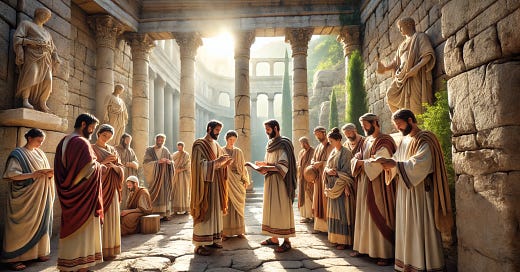Pious (ὁσιότητι)
The word pious (ὁσιότητι) is often translated as “holy”. However, in the original Greek, it actually expresses holiness in action. It describes a person who demonstrates their faith through worship, moral behavior, and adherence to spiritual practices.
As an apostle, Paul determined that men should worship in every place, lifting up pious hands. These are hands that work out the holiness they possess in Christ (1 Timothy 2:8: Therefore, I determine the men to worship in every place while lifting up pious hands apart from wrath and disputing). Paul is not instructing us to lift up our hands during a worship service or in Church while praying. Instead, he expresses that our hands are to work out the holiness that we have in Christ, while giving God credit for Who He is and what He has done—this is worship.
Holiness conveys a separation unto something or someone, whereas being pious refers to actions that demonstrate our separation unto God. This naturally results in the rejection of the things of the flesh in our lives, the world, and Satan because they are contrary to who we are in Christ.
One of the requirements of a Bishop (Pastor or Elder) is to be pious (Titus 1:8: but fond of strangers, fond of good, a saved frame of mind, just, pious, and self-controlled). As one who is responsible for an assembly, there are specific Scriptural requirements to hold the position of a Pastor. These men are not to be self-willed, not addicted to wine, not fond of money gained through false means. Instead, they are to be hospitable, fond of goodness, having a saved frame of mind, while holding fast the doctrine of the word of faith. This will result in a lifestyle that shows forth their separation unto God. Being pious is accompanied by righteousness and blamelessness (1 Thessalonians 2:10: You and God are my witnesses as pious and just and blameless we became…), as these characteristics show that an individual is separated unto God.
Living piously is not about rejecting what everyone else is doing, and it certainly has nothing to do with judging or looking down on others. It is holiness in action. We are separated unto God and, therefore, our actions are to demonstrate this. This separation is not achieved by avoiding people and bad conduct, but by separating ourselves to God and living out who we are in Christ. We will not get involved with the wrongdoings of others because we are busy doing the good works God prepared beforehand for us to do.
We are saints (Romans 1:7), not sinners saved by grace. God saved us by grace, and we are now free from sin and bound to righteousness (Romans 6:18). A saint is one who is set apart, one who is holy. In Christ, we are saints because we are separated unto God. Therefore, let us live out the holiness we have in Christ, as it demonstrates who we are because of salvation.
Christ is our example of how to live this out. For God said, “I will not allow My Pious One to see corruption” (Acts 2:27). Christ lived out the desirous will of God the Father over His Own (Hebrews 7:26). We live piously by doing the same thing—knowing and doing God’s desirous will (Romans 12:2), for the will of God abides into the age, unlike the desires of the flesh and the world that are constantly changing (1 John 2:17).
We are the children of God, the children of light. We are free from sin and bound to righteousness because we are separated unto God. Living piously is not about appearing “religious” or merely engaging in religious practices. Instead, it reflects a hospitable attitude, a fondness for goodness, and a saved frame of mind—a lifestyle that flows from holding fast to the doctrine of the word of faith. Today, let us live piously, focusing our minds on who we are in Christ and demonstrating through our actions that we are set apart unto God.




